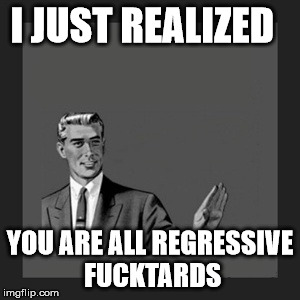NationalRus wrote:fucktard what the people make out of ther country and protest is another thing, maidan had legitimate reasons like corruption till it was hijacked thats not a reason to STFU and take it up the ASS by the regime, its for brazilians to decide what happens in their country and what they will make out of it.
you leftist scum keep destroying not on latin america but the whole world, funny fact chile thanks to pinochet evil reforms its the most free economy in latin america, with the 4th highes gdp per capita including USA and canada in the americas and the highest quality of life in whole latin america.
cry your tears leftist scum, this thread ain't gone be so rosy with your SJW dog gone



Maidan had no legitimate reason whatsoever. It's simple math, if you have 5 cows, but to get better you have to kill 6, then you're not making things better, but worse.
Same things for Egypt, for Tunisia or Syria.
Regime which one, el retardo? The one that is skimming IMF loans or the one that was not even getting them? Corruption in country within and identity crisis? Say it ain't so durak?
Hahahah, Chile was bankrupt thrice when Pinochet stepped down ,that's why he stepped down by the way. The Dollarization of the economy completely destroyed Chilean Industry (ironically it did the same with UK and on a lesser extent US).
Best part of today's Chile? It's the current most efficient LatAM fiscal paradise and money laundering machine. In ten years Chile had grown it's GDP by 4 (400%). Not even China has been able to do that. And this was the 90's...
Also, I don't care about Dilma, i care about people who are easily swept away by bona fide retards like yourself promoting "Aryan values" among "brown" people...Yeah sure Brazil is going forward...anyday now.
http://www.multinationalmonitor.org/hyper/issues/1994/08/mm0894_12.html
Truth wrote:Official unemployment fell to a 20-year low at 4.5 percent in 1992, from 27 percent in 1982 and 5.7 percent in 1990. At the same time, the work week lengthened, with the average increasing from 48.5 hours per week in 1990 to 50.5 hours in 1992.
The Aylwin administration acknowledged the "social debt" owed to those who have yet to benefit from the economic "miracle," and made poverty alleviation a priority. The number of people officially defined as living in poverty dropped from 5 million to 4 million, in a country of 13 million, partly as a result of increases in the minimum wage and pensions and increased government expenditures on social services, and partly due to economic growth which decreased unemployment.
Nevertheless, poverty rates remain much worse than before the neoliberals took over national economic policy. From 1970 to the early 1990s, the percentage of households living below the poverty and indigence lines skyrocketed. In 1970, before Pinochet took power, 17 percent of Chilean household incomes were below the poverty line; by 1990, the rate had doubled, with 35 percent of the households living in poverty; and in 1992 it was still 33.5 percent. After 10 straight years of economic growth, income distribution figures show little improvement.
Poverty in Chile is caused not so much by unemployment as precarious employment and low wages. As a result of labor's weak bargaining power, wage increases have continually lagged behind productivity gains. While the centrist and leftist political parties promoted "growth with equity" as an economic strategy during the 1960s and early 1970s, today "growth with stability" is the Concertación's mantra.
The Concertación considers its reform of the labor legislation inherited from the dictatorship one of its major accomplishments. The government lifted the 60-day limit on strikes, and unions are now allowed to join in confederations. But the government denied organized labor's principal demand, obligatory collective bargaining at the industry level, rather than at the firm level, and legal obstacles continue to impede efforts to rebuild the union movement. José Piñera, author of the 1979 Labor Plan, called the Plan a building that could not be burned down, and indeed the basic structure is still standing.
That organized labor has made such limited gains since the transition reflects in part the weakness of labor as a movement. Unions have only recently begun to rebuild at the base, and with mixed results. Between 1989 and 1991, workers formed thousands of new unions, but many other unions are no longer active. In 1993, 13.1 percent of the Chilean labor force was unionized, up from 9.8 percent in 1988, but a decline from 1991's 14.5 percent membership level. Many of the new unions, fruit of the high hopes and enthusiasm of the transition period, have found that collective negotiations were not very successful. The bulk of firm-level unions, the only type of union with which employers must negotiate, have only 25 to 50 members, and correspondingly little power.
The Concertación's strategy of elite negotiation and social demobilization has led to a stable transition period, yet one marked by few concessions from the Right or big business. While Chile under Aylwin saw some major strikes, especially by state and state-enterprise workers such as teachers, health workers and copper miners, on the whole, the Aylwin years were far more remarkable for their stability than for conflict.
it hurts









